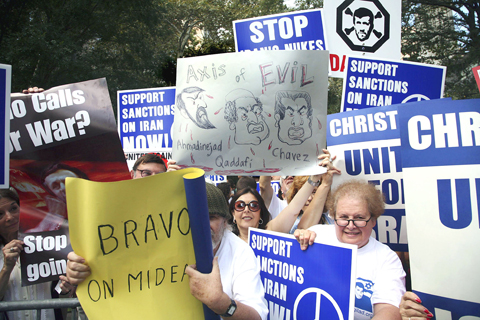China dampened expectations of further sanctions on Iran on Thursday, telling other major powers that more pressure would not persuade Tehran to halt its nuclear program.
In contrast, British Prime Minister Gordon Brown told the UN Security Council the world should consider “far tougher sanctions” if Iran continues to seek a nuclear weapon.
Both countries signed a letter on Wednesday in which the five permanent members of the Security Council and Germany told Iran to prepare a “serious response” by Thursday to demands that it halt its nuclear program, or face the consequences.

PHOTO: REUTERS
Britain, China, France, Russia and the US are the permanent members of the 15-nation Security Council.
“As evidence of its breach of international agreements grows, we must now consider far tougher sanctions together,” Brown told a council meeting on nuclear proliferation chaired by US President Barack Obama.
At the end of the two-hour session, council members unanimously approved a resolution calling for an end to the proliferation of atomic weapons, but did not name Iran or North Korea, which is also in a standoff over its nuclear program.
The US-drafted resolution called for further efforts to achieve “a world without nuclear weapons” and all urged countries to sign the 1970 nuclear Non-Proliferation Treaty.
Obama said he and Russian President Dmitry Medvedev agreed this week that additional UN sanctions would be considered if Iran doesn’t respond to proposals to end the nuclear standoff.
“We’ll be particularly telling Iran it’s got a decision to make,” Brown told the BBC before the council meeting. “It can work with the international community. We can help it get civil nuclear power, but if it persists with this course, it’s going to be isolated from the whole international community.”
The West suspects Iran’s nuclear program is aimed at developing atomic weapons. Iran insists it is limited to the peaceful generation of electricity and has rejected Security Council demands that it suspend sensitive nuclear activities.

AIR SUPPORT: The Ministry of National Defense thanked the US for the delivery, adding that it was an indicator of the White House’s commitment to the Taiwan Relations Act Deputy Minister of National Defense Po Horng-huei (柏鴻輝) and Representative to the US Alexander Yui on Friday attended a delivery ceremony for the first of Taiwan’s long-awaited 66 F-16C/D Block 70 jets at a Lockheed Martin Corp factory in Greenville, South Carolina. “We are so proud to be the global home of the F-16 and to support Taiwan’s air defense capabilities,” US Representative William Timmons wrote on X, alongside a photograph of Taiwanese and US officials at the event. The F-16C/D Block 70 jets Taiwan ordered have the same capabilities as aircraft that had been upgraded to F-16Vs. The batch of Lockheed Martin

GRIDLOCK: The National Fire Agency’s Special Search and Rescue team is on standby to travel to the countries to help out with the rescue effort A powerful earthquake rocked Myanmar and neighboring Thailand yesterday, killing at least three people in Bangkok and burying dozens when a high-rise building under construction collapsed. Footage shared on social media from Myanmar’s second-largest city showed widespread destruction, raising fears that many were trapped under the rubble or killed. The magnitude 7.7 earthquake, with an epicenter near Mandalay in Myanmar, struck at midday and was followed by a strong magnitude 6.4 aftershock. The extent of death, injury and destruction — especially in Myanmar, which is embroiled in a civil war and where information is tightly controlled at the best of times —

Taiwan was ranked the fourth-safest country in the world with a score of 82.9, trailing only Andorra, the United Arab Emirates and Qatar in Numbeo’s Safety Index by Country report. Taiwan’s score improved by 0.1 points compared with last year’s mid-year report, which had Taiwan fourth with a score of 82.8. However, both scores were lower than in last year’s first review, when Taiwan scored 83.3, and are a long way from when Taiwan was named the second-safest country in the world in 2021, scoring 84.8. Taiwan ranked higher than Singapore in ninth with a score of 77.4 and Japan in 10th with

SECURITY RISK: If there is a conflict between China and Taiwan, ‘there would likely be significant consequences to global economic and security interests,’ it said China remains the top military and cyber threat to the US and continues to make progress on capabilities to seize Taiwan, a report by US intelligence agencies said on Tuesday. The report provides an overview of the “collective insights” of top US intelligence agencies about the security threats to the US posed by foreign nations and criminal organizations. In its Annual Threat Assessment, the agencies divided threats facing the US into two broad categories, “nonstate transnational criminals and terrorists” and “major state actors,” with China, Russia, Iran and North Korea named. Of those countries, “China presents the most comprehensive and robust military threat